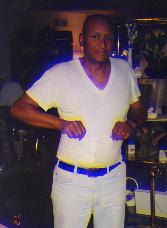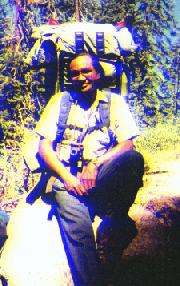Served His Country, Family And Community With Pride And Honor
Martin Tutt was a hard-working dedicated man. A loving husband and father of three (3) children, he was also respected by his co-workers. Martin Tutt worked 7 days a week to provide for his family. He always dreamed of retiring in the mountains.
Martin grew up in Wichita, Kansas. In 1957, at the age of seventeen, Martin Tutt joined the Naval Reserve. After graduating from high school in early 1958, he began regular active duty and was assigned to the USS Laws at the\ Brooklyn Naval Yard in New York. In 1959, he was transferred to the USS Los Angeles, which was drydocked at the shipyard in Long Beach.
The USS Los Angeles was scheduled to be the first ship with a guided missile system, and major conversions and repairs were necessary to make this possible. Workers in many trades worked side-by-side to prepare the ship. Martin Tutt was an Electrician's Mate. He was responsible for the maintenance and repair of the electrical equipment on board. After the conversion was completed, the USS Los Angeles sailed to Japan, the Philippines, Hong Kong, and Pearl Harbor, Hawaii.
After receiving an honorable discharge from the Navy, Martin Tutt went to work for McDonnell Douglas Aircraft in Long Beach as an insulation electrician. During his 27 years at McDonnell Douglas, Martin was an outstanding employee. He had an excellent safety record and received numerous letters of accommodation. Respected by his fellow workers, he was the "go to" man when his co-workers had questions. Martin often worked 12 hours a day for weeks on end. He wanted to provide for his family the needs and comforts that he never had as a child.
Throughout his life, Martin had very few health problems. But on October 31, 1993, Martin's wife Louise rushed him to the emergency room. Martin could not breathe. The doctors first diagnosed him with pneumonia. When he did not improve with antibiotics, Martin returned to the hospital.
Martin was hospitalized, and two and one-half quarts of fluid were drained from his right lung. The fluid was sent to the laboratory for analysis and cancer cells were found. Chest films and a CT scan showed evidence of a right pleural effusion with a pleural nodule.
A biopsy was performed. The biopsy suggested adenocarcinoma, and Martin was scheduled for exploratory surgery. The pre-operative plan was to remove the tumor from his right lung. However, when the surgeon saw numerous clusters of tumors covering Martin's right lung, he realized that all of the tumors could not be removed. Tissue samples were taken, and after surgery, Martin and his wife were given the grim diagnosis of mesothelioma.
Martin Tutt insisted that his doctors be truthful with him and give him the facts about treatment options, including chemotherapy and radiation. Understanding that there was no cure, Martin consented to chemotherapy, hoping that it would slow the growth of the tumors. After 4 cycles of chemotherapy, the tumors continued to grow. Martin received another 3 rounds of chemotherapy.

Unfortunately, the chemotherapy made Martin violently ill. He lost his appetite. He lost weight. He had to force himself to eat. Martin said that after chemotherapy everything changed, including his taste buds, hearing, and eyesight. He lost feeling in his feet and hands. He also experienced a kind of euphoria. Hallucinations made it seem like nothing was real.
Even so, Martin was not ready to give up on modern medicine. In his view, doctors and cancer research scientists were finding new cures every day. Martin said that he didn't mind "being the first one" to try a new experimental drug or protocol. Anything to stay alive.
When his wife Louise also became ill and unable to work, the Tutt's were forced to file for bankruptcy protection to save their home of 21 years. For Martin, this was an embarrassing situation. A financially frugal person, Martin described the process of filing for bankruptcy, ". . . like getting on your knees and saying uncle." He felt ashamed because it was not something they would have done if he been able to work.
Martin Tutt loved life and struggled to stay alive for his wife and family. He lived for 1 year, 2 months and 8 days after he was diagnosed with mesothelioma. He died at his home on January 22, 1995.
I will never forget taking Martin's deposition in his home. It was a hot day and the room was crowded with several asbestos lawyers. Despite the heat, the pain and the grilling, Martin told his story proudly and emphatically. This man served his country and his family with honor and distinction. His daughter also joined the marines but at the tender age of 22 was killed in a helicopter accident. He never sought sympathy or hand outs. He was a problem solver, but mesothelioma is one problem that even Martin Tutt couldn't solve.
** POSTED JANUARY 29, 1999 **

